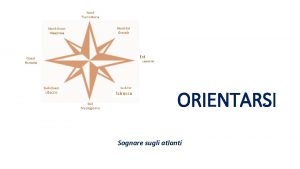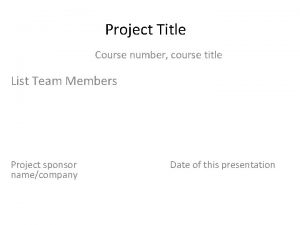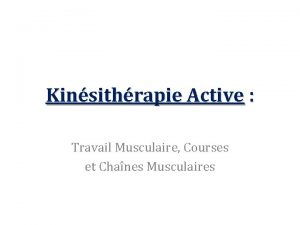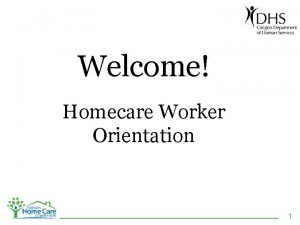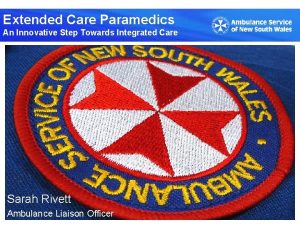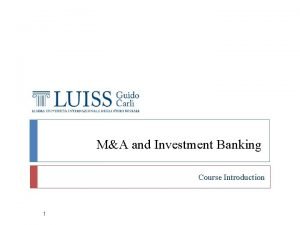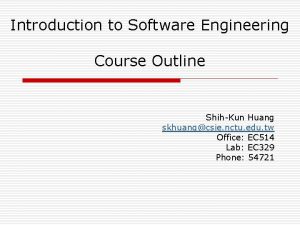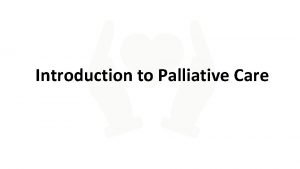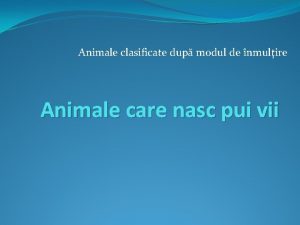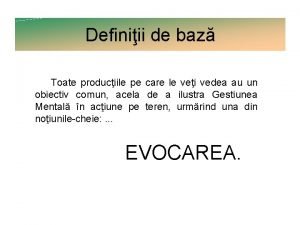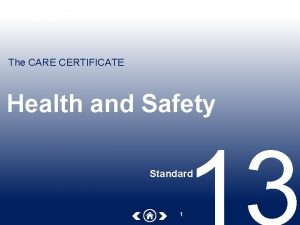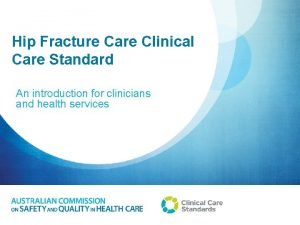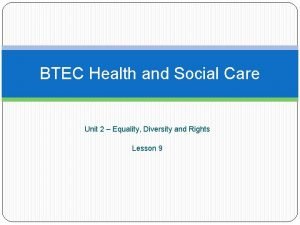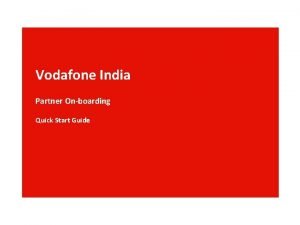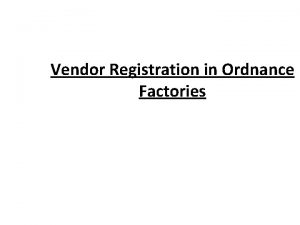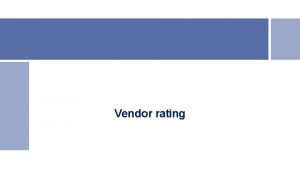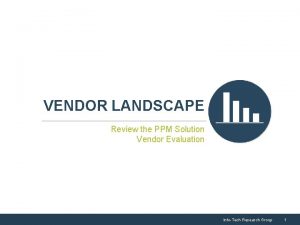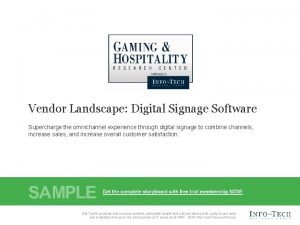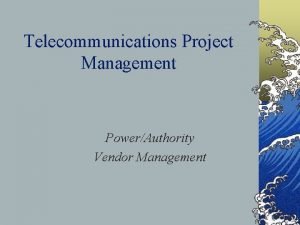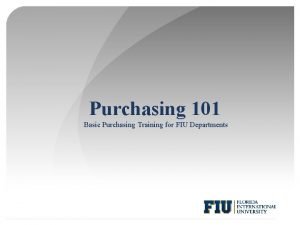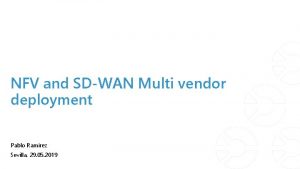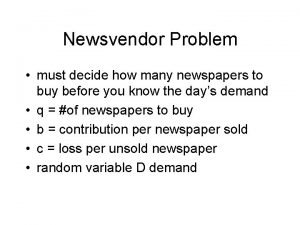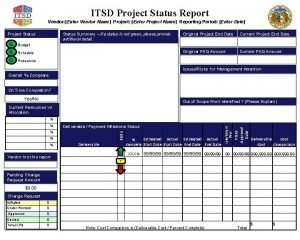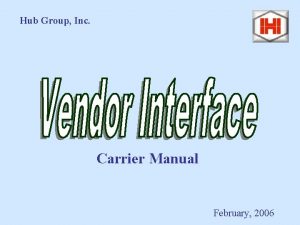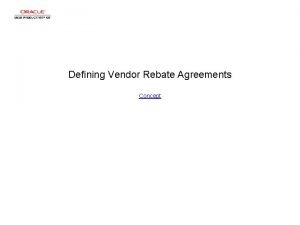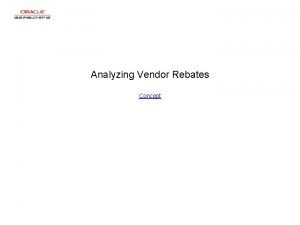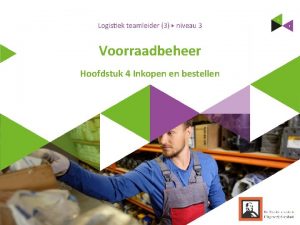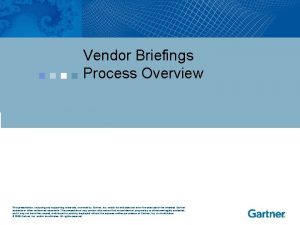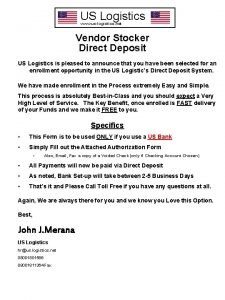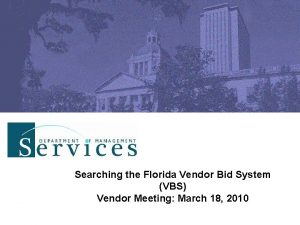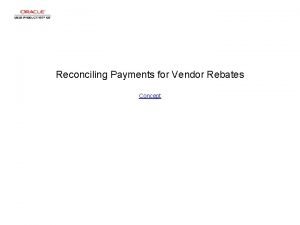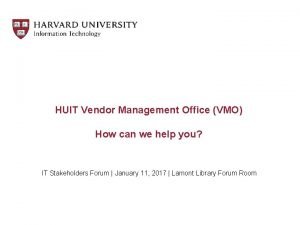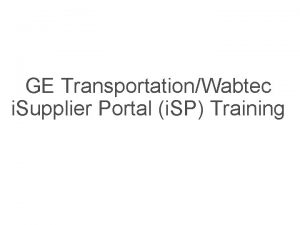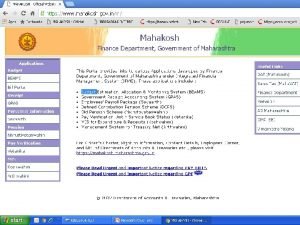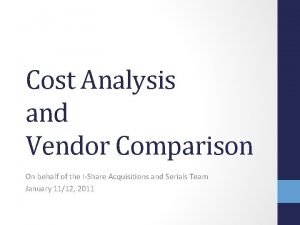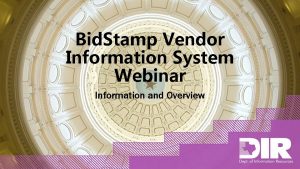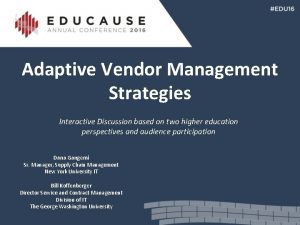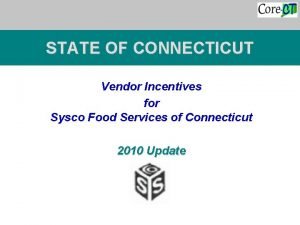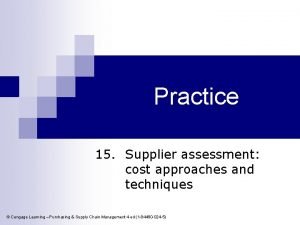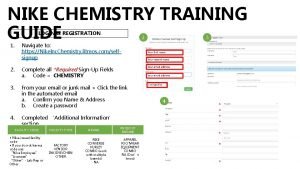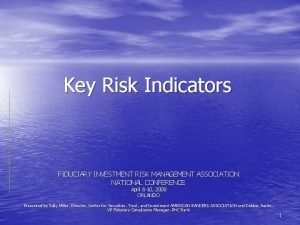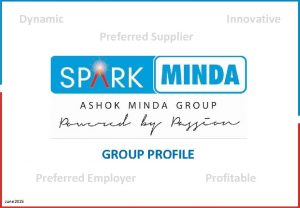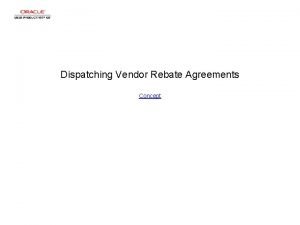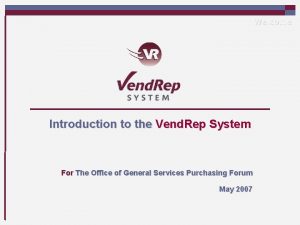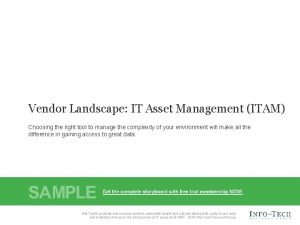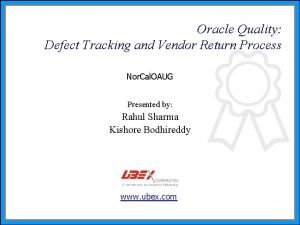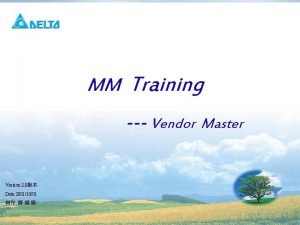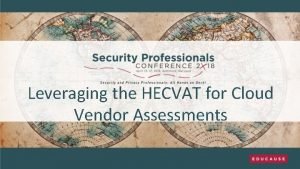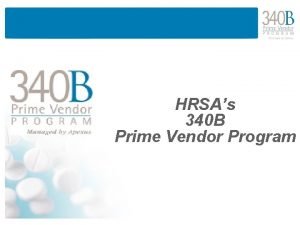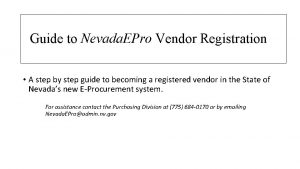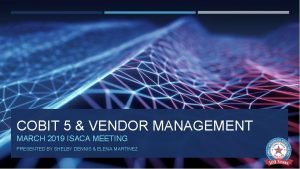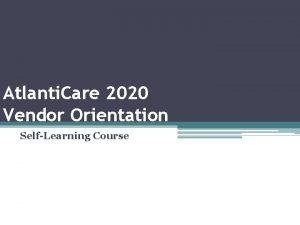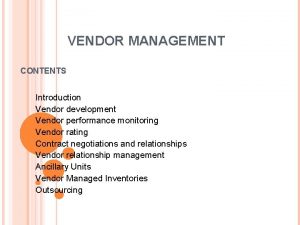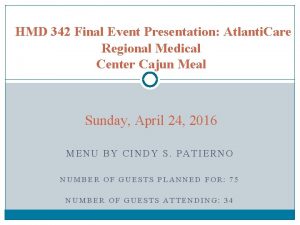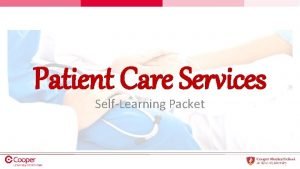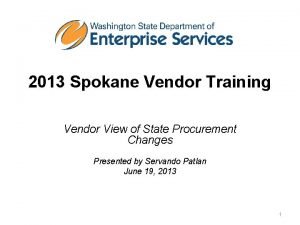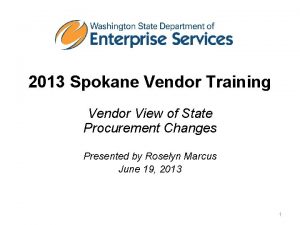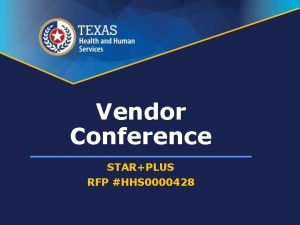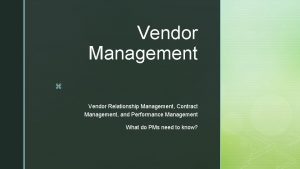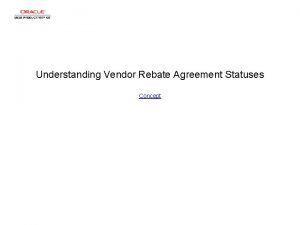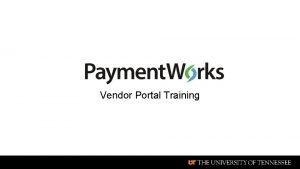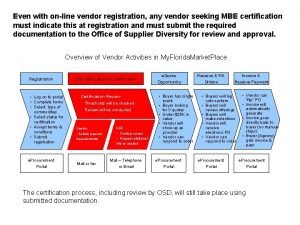Atlanti Care Vendor Orientation 2019 SelfLearning Course Introduction
































































































- Slides: 96

Atlanti. Care Vendor Orientation 2019 Self-Learning Course

Introduction Orientation is required for each Atlanti. Care vendor. This self-learning course is intended to cover the key topics that are pertinent for contractors and vendors to know. Topics include safety information, strategies for providing excellent customer experiences, cultural diversity and inclusion, Early Heart Attack Care (EHAC), Emergency Medical Treatment and Active Labor Act (EMTALA), Social Media usage, Health Insurance Portability & Accountability Act (HIPAA), Corporate Compliance, Harassment and Discrimination information, and more. You must complete the test after this educational section to receive credit for having completed the self-learning course.

Atlanti. Care’s Strategy Map The Atlanti. Care Strategy Map helps to guide us in the right direction. Starting at the bottom of the map, our mission is stated as, “we make a difference in health and healing, one person at a time, through caring and trusting relationships. ” This is done by living our values of safety, teamwork, integrity, respect, and service. By assuring all members of the Atlanti. Care family act on our values, we are able to focus on the performance excellence commitments of our “ 5 Bs. ” These include Best People and Workplace, Best Customer Service, Best Quality, Best Growth, and Best Financial Performance. Our attention to these details will move us closer to our vision of building healthy communities together. The Strategy Map is used to help identify how your work will contribute to these commitments.

Atlanti. Care Family Commitments The Atlanti. Care Family Commitments were created to nurture our values and to grow our culture. The Family Commitments were created in 2019 to help us to better define our culture and the behaviors that are expected. Based on feedback given through many focus groups, twelve overlapping behaviors were identified and then named as the Family Commitments. One Family Commitment is highlighted a month via many communication methods to help make it real. Atlanti. Care Family Commitments: 1. Create excellent encounters 2. Walk the talk 3. Be curious and innovative 4. Practice humility and civility 5. Keep Atlanti. Care proud 6. Make your work matter 7. Choose your words carefully 8. Practice self-care and find joy 9. Understand your patients and/or customers 10. See something, say something 11. Celebrate! 12. Do the right thing and do things right

Infection Control and Prevention

When to Perform Hand Hygiene? Clean your hands: § Before eating § Before and after having direct contact with a patient’s intact skin (taking a pulse or blood pressure, performing physical examinations) § After contact with blood or bodily fluids § After contact with inanimate objects (including medical equipment) § After glove removal Soap and water hand hygiene is needed: § After using a restroom § When hands are visibly soiled

How to Properly Hand Wash § Rub hands vigorously for at least 20 seconds § Don’t forget: backs of hands, wrists, between fingers, tips of fingers, and under fingernails § Dry hands completely § Organisms can be spread in higher numbers when hands are wet compared to hands thoroughly dry

How to Properly Hand Rub § Dispense alcohol hand rub § Rub hands for at least 20 seconds until completely dry § Don’t forget: backs of hands, wrists, between fingers, tips of fingers, and under fingernails § Do not rub excess product off

Respiratory Etiquette § Cover your mouth and nose with a tissue or your upper sleeve when coughing or sneezing § Put your used tissue in the trash § Wash your hands with soap and water OR alcohol-hand gel immediately after

Flu Season Be Safe, Get Vaccinated A goal at Atlanti. Care is to promote healthy communities. This includes our patient communities, our own communities and our Atlanti. Care employee community. All employees are to register their Flu choices by October 31, 2019. This is a Role requirement goal for 100% registration of all employees. Nonregistered employees will receive a “Needs Improvement” on their annual evaluation. The Share the Success goal changes yearly to coincide with the Centers for Medicare & Medicaid Services (CMS) goals. Unvaccinated employees will be required to wear a surgical mask during the Flu season.

Social Media

Social & Digital Media Include: • Social networking (Facebook, Twitter, Instagram, You. Tube) • Forums, discussion boards, and groups • Professional networking (Linked. In) • Knowledge / Information aggregation (Wikipedia)

Atlanti. Care’s Social Media Policy - #4313 • Applies to all Atlanti. Care staff, physicians and other providers, vendors and volunteers. • Provides guidance for using social media appropriately. • Is aligned with policies and procedures in Atlanti. Care’s Employee Handbook. • Employees are expected to know and follow this policy. Nothing in this policy is, however, intended to prevent employees from engaging in concerted activity protected by law. If you have any questions regarding this policy, please ask your supervisor and/or Human Resources representative before acting.

Atlanti. Care uses social media to: • Listen to and learn from customers • Identify and respond to compliments, concerns, and issues in real-time • Enhance brand awareness • Promote our programs and services

Highlights of Atlanti. Care’s Social Media Policy Always protect private and confidential information, such as patients’ social security numbers and/or medical information. Atlanti. Care’s Code of Conduct and other policies apply to all your interactions – including those on/through social media. Atlanti. Care Marketing and Communications must approve any website or social media activity related to Atlanti. Care (not including web-based applications involving wages, benefits, or other terms and conditions of employment, or protected concerted activity).

Social Media Tips & Guidelines Be respectful of and professional with fellow employees, business partners, competitors, patients, and other members of the public while in the course and scope of Atlanti. Care business. Never harass (as defined by our Harassment-Free Workplace Policy, #409), threaten, libel, or defame fellow professionals, employees, clients, competitors, or anyone else. It is wise to remember that what you say in social media can often be seen by anyone and remain indefinitely. Therefore, harassing comments, obscenities or similar conduct that would violate Atlanti. Care policies is discouraged in general and is never allowed while using Atlanti. Care communications technology or property or during your working time. Respect copyright, trademark, and similar laws and use such protected information in compliance with applicable legal standards.

What is NOT appropriate to post or share It is not appropriate to post, share or comment on: Anything that could identify a patient, including general references to celebrities and patients of media interest. Proprietary Atlanti. Care information (business, financial and marketing strategies) without advance approval of your supervisor, Human Resources and Atlanti. Care Marketing and Communications. Pictures of yourself or others at work if patient or other protected health information can be identified in the picture either through casual viewing or through image enhancement. Malicious, obscene, threatening or intimidating statements that disparage patients, clients or co-workers, or that might constitute harassment or bullying. Examples of such conduct might include offensive posts meant to intentionally harm someone’s reputation or posts that could contribute to a hostile work environment on the basis of race, sex, disability, religion or any other status protected by law or Atlanti. Care policy.

Information Security

Information Security The Institute for Critical Infrastructure Technology (ICIT) has called 2016 “The Year of Ransomware” During 2016, a ransomware variant was observed infecting computers belonging to healthcare facilities and hospitals in the United States, New Zealand, and Germany. Ransomware is a type of malware that infects computer systems and restricts access in an attempt to extort money. q Researchers at Symantec reported an average of 4, 000 ransomware attacks per day q Systems infected with ransomware may also contain other malware q Loss of access to patient data can result in a delay to critical services and communications q Unplanned downtime may cost an average of $7, 900 per minute Ransomware is often spread by phishing emails. A phishing email may contain malicious attachments or direct a user to infected websites where the malware is installed without the knowledge of the user.

Information Security A chiropractic therapy office located in Michigan notified 4, 082 patients of a PHI data breach due to a server infected with Malware is malicious software. It can be hidden in software programs and attached to emails. It can be used for advertising, stealing passwords, and sensitive data. Malware can spread from one machine and infect an entire network q According to Symantec, 45. 5 million new malware variants were reported for the month of August. How can you help prevent a malware infection? q Do not attempt to download any unauthorized software to Atlanti. Care workstations without proper approval from Atlanti. Care Information Security. q Be cautious of spam emails that contain links or attachments, even if you know the sender. When in doubt, forward it to ITSecurity@atlanticare. org for review. q Do not insert discs or flash drives into your computer when you are unsure of the content or its origin.

Information Security North Memorial Hospital will pay $1. 55 million to settle federal regulatory complaints that it mishandled patient data stored on a stolen laptop computer. q The laptop contained unencrypted patient data q Physical loss of hardware (lost or stolen laptops, hard drives, thumb drives, phones, and physical files) comprised more than 50% of health care’s industry breaches q 55% of compromised patient records were the result of a failure to encrypt data

Phishing For Dollars q When internet fraudsters impersonate a trusted business or individual to trick you into giving out your personal information, it’s called PHISHING. q Phishing attacks directed at specific individuals, roles, or organizations are referred to as “Spear Phishing. ” The term “Whaling” is used when those attacks are directed specifically at executive officers or other high-profile targets of an organization. q Phishing attacks use email or malicious websites to solicit personal information often by spoofing the email address of a person within Atlanti. Care or some other trusted source. q An attacker may also send email seemingly from a reputable credit card company or financial institution that requests account information, often suggesting that there is a problem. When users respond with the requested information or open an attached document, attackers can use it to gain access to the accounts.

How Do You Avoid Being a Victim? q When in doubt, throw it out! Links or attachments in emails, tweets, posts, and online advertising are often the way cybercriminals compromise your computer. If it looks suspicious, even if you know the source, it’s best to delete it or verify the sender via out-of-band communication. q Pay attention to the URL of a link or website. Malicious websites may look identical to a legitimate site, but the URL may use a variation in spelling or a different domain (e. g. , . com vs. . net. ). Be suspicious of URLs hosted in foreign countries (e. g. , . ru is Russia, . br is Brazil, . cn is China). q Be suspicious of unsolicited phone calls, visits, or email messages from individuals asking about employees or other internal information. If an unknown individual claims to be from a legitimate organization, try to verify his or her identity directly with the company. q Don’t send sensitive information over the Internet before checking a website’s legitimacy and security.

Information + Security q Atlanti. Care and other reputable organizations will never use email or call you to request your password, Social Security number, or confidential information. q Be suspicious of any email message that asks you to enter or verify personal or financial information through a web site or by replying to the message itself. NEVER reply to or click the links in a message without verifying the authenticity of the sender. q If you think the message may be legitimate, go directly to the company’s web site (i. e. , type the real URL into your browser) or contact the company to see if you really do need to take the action described in the email message. q Do not provide personal information or information about Atlanti. Care, including organizational structure or networks, unless you are certain of a person's authority to have the information.

Information Security + You What actions should you take if you think you are a victim? q If you believe you might have revealed sensitive information about Atlanti. Care or compromised your account or computer, immediately contact the Atlanti. Care Customer Support Center. q Immediately change any passwords you might have revealed. If you used the same password for multiple resources, make sure to change it for each account, and do not use that password in the future. q If you believe your financial accounts or credit cards have been compromised, contact the financial institutions immediately and close any accounts or change any cards that may have been compromised. Watch for any unexplainable charges to your account.

Password Settings for Atlanti. Care Login Accounts Password settings for Atlanti. Care login accounts have been adjusted to ensure compliance with federal HIPAA/HITECH regulations and Atlanti. Care policy. Atlanti. Care Password Policy Reminders: • User passwords must be changed at least every 90 days (4 times a year) • Passwords must be at least 12 characters in length • Passwords must contain each of the following: o Passwords must contain 1 special character (i. e. $, #, ! , *, etc. ) o Passwords must contain 1 uppercase character o Passwords must contain 1 lowercase character o Passwords must contain 1 number • Passwords should not be dictionary words, user’s name, address, date of birth, username, nickname, or any term that could easily be guessed • Passwords must not be written down or shared with anyone else Tips to Help you with Passwords Here and at Home: • Consider using a passphrase or sentence such as “IL 0 ve. Atlanti. Care!” – including spaces and capital letters creates a strong password that you can remember • Do not reuse passwords across applications at home or at work, just as you would never carry one key that unlocks your house, your car, your office, and your safety deposit box

Information Security Good security practices are an essential part of patient care. Atlanti. Care depends on each and every one of us to be informed, responsible, and on guard to protect our network, information, and our patients. Think before you click! If you have questions about any information security topic, please contact the Information Security team at (609) 569 -7070 or email ITSecurity@atlanticare. org for assistance.

Stroke Awareness, Heart Attack, and Organ Donation

Stroke Awareness What is B-E-F-A-S-T? B-E-F-A-S-T is an acronym for recognizing and responding to the symptoms of stroke. It stands for: B Balance E Eyes F Face A Arms S Speech T Time Be alert! BE FAST. It is important for us to know the signs and to teach others. • Sudden Loss of Balance • Sudden Loss of vision in one or both Eyes • Sudden numbness or weakness of the Face, Arm or leg, especially on one side of the body (Can the person smile? Has his/her mouth or eye drooped? ) • Sudden confusion, difficulty with Speech, word finding or understanding • Sudden trouble walking, dizziness, loss of balance or coordination • Sudden, severe headache with no known cause • TIME IS BRAIN

Stroke Awareness If you witness someone with the symptoms listed in the previous slide, based on where you work, you should call for help using the following numbers: • Patient care delivery areas, Nursing units (with the exception of Critical Care and Emergency Departments): Call a MET – Dial 1 -2222 at the City Campus or 2 -2222 at the Mainland Campus • All other areas of the hospital, for visitors, employees and outpatients: Call a Code 10 - Dial 1 -2222 at the City Campus or 2 -2222 at the Mainland Campus and tell the operator what you are witnessing. • All ARMC off-campus areas – Dial 911

Understanding Heart Attacks • Every 40 seconds someone in the United States has a myocardial infarction commonly called a heart attack. • A heart attack occurs when the blood flow that brings oxygen to the heart muscle is severely reduced or cut off completely. • Atlanti. Care Regional Medical Center is the only health system in Atlantic and Cape May counties to provide full service care for heart attacks. • The Heart Institute at ARMC has low door to balloon (D 2 B) times • D 2 B is measured in minutes from when the heart attack is first identified to time treatment is delivered • Current best practice is less than 90 minutes • ARMC has D 2 B times consistently less than 90 minutes

Heart Attack Risk Factors • High Blood Pressure* • 1 st or 2 nd hand smoke exposure* • High cholesterol and/or triglycerides* • Sedentary lifestyle* • Obesity* • Diabetes* • Increased age (greater than 65) • Family history * Risk factors that can be modified, controlled, or treated by changing lifestyle or taking medication

Heart Attack Warning Signs Chest discomfort Most heart attacks involve discomfort in the center of the chest that lasts more than a few minutes, or that goes away and comes back. It can feel like uncomfortable pressure, squeezing, fullness, or pain. It is often described as chest pressure that feels like an elephant sitting across the chest. Discomfort in other areas of the upper body Symptoms can include pain or discomfort in one or both arms, the back, neck, jaw, or stomach. Shortness of breath With or without chest discomfort. Other signs May include breaking out in a cold sweat, nausea or lightheadedness. Women and Diabetics Women typically may experience shortness of breath, pressure or pain in the lower chest or upper abdomen, dizziness, lightheadedness or fainting, upper back pressure, or extreme fatigue and anxiety. Diabetics may present with no pain—mostly vague complaints of nausea, vomiting, and shortness of breath.

Heart Attack Prevention and Treatment The American Heart Association recommends that heart disease prevention begin early in life. This means assessing your risk factors and working to keep them low. Learn the ABCs of heart attack prevention: Live better with Life’s Simple Seven: Manage blood pressure Control cholesterol Reduce blood sugar Get active Eat Better Lose Weight Stop Smoking

To Activate Care for a Heart Attack Initiate treatment promptly • At ARMC City Campus call 1 -2222 • At ARMC Mainland Campus call 2 -2222 • Outside of the hospital campuses call 911 In house, tell the operator what is happening • MET call—for admitted in patients • Code 10—for outpatients, visitors or staff • Code Blue/Code Blue 10—for patient who is in Cardiopulmonary Arrest

Organ/Tissue Donation More than 115, 000 people are waiting for transplants nationally. 5, 300 of them are in our service region. Twenty people in the USA die each day while waiting for a transplant. If there is no designation on your driver’s license or other legal means of donor designation, the final decision about organ and tissue donation will be made by your next of kin. Your decision to be an organ donor can make a difference in as many as 50 other lives. Anyone can decide to be a donor. At the time of death, a person’s physical condition, not age, determines the potential for organ and tissue donation. In the event of an accident or emergency, physicians and nurses will do everything possible to save your life. The medical team treating you is always completely separate from the transplant team.

Harassment and Discrimination-Free Workplace & Identifying and Addressing Impairment

Harassment and Discrimination-Free Workplace As part of our commitment to Best People/Best Workplace, Atlanti. Care is firmly committed to maintaining a work environment that is free from all forms of discrimination and workplace harassment. Employees are required and encouraged to promptly report any incident or behavior they feel may violate this policy. What is discrimination? Treating someone differently in any job related action because of a “protected category”: race, skin color, religion, gender, pregnancy, national origin, disability, perceived disability, age, creed, ancestry, marital status, domestic partnership status, affectional or sexual orientation, gender identity or expression, atypical hereditary cellular or blood trait, genetic information, military service, or AIDS and HIV related illnesses. What is Harassment? Unwelcome conduct that occurs based on a person’s protected category (i. e. , gender, race, disability, sexual orientation), that a reasonable person of the same protected category would find severe or pervasive enough to create an intimidating, hostile, or offensive working environment. If you feel as though you are experiencing or have observed discrimination or harassment, please immediately report this to your supervisor, Human Resources, or any member of Atlanti. Care’s management team. You may also submit an anonymous report through our Compliance Hotline. Human Resources will promptly investigate and take appropriate action. You will not be retaliated against for reporting.

Impairment Atlanti. Care is committed to ensuring nothing interferes with the care, safety, and well-being of our customers and employees. Impairment is being unable to safely perform one’s job due to physical or mental unfitness. Impairment can be the result of: • • Being under the influence of drugs or alcohol Lack of sleep Psychological ailments such as depression or stress Working while sick Any impairment can impact an employee’s job performance. When an employee is impaired, his/her ability to adequately react and/or care for our patients and customers can be affected. If you think a co-worker, medical staff member, or contractor on site is working while impaired, our policies require that you report your concerns immediately to your supervisor, any member of the leadership team, or Human Resources.

Diversity and Inclusion

Diversity and Inclusion Strategic Purpose To further position Atlanti. Care as a leader and trusted partner in the delivery of culturally and community competent respectful health care services to our diverse community.

Diversity and Inclusion Focus Areas Recruitment Build healthy communities • Recruit a diverse workforce reflective of the communities we serve. Employee Engagement Customer Experience • Foster a learning environment that values diversity and encourages employees to reach their full potential. • Provide customer experiences reflective of beliefs, cultural and community practices to foster an environment of respect for our diverse patients and their families.

Who are our customers? In addition to our ethnic communities, we serve other patient communities, such as: • • Veterans/Military and families Blind, deaf, and hard of hearing Elderly Homeless LGBTQ Physically Challenged Patients representing over 62 languages Patients representing over 49 religions

Policies and Practices Policies and practices that support an inclusive environment for our workforce and patients include the following three policies: 1. Equal Employment Opportunity, Non-Discrimination and Code of Conduct – Policy #375 2. Atlanti. Care Patient Bill of Rights 3. Patient Visitation

Equal Employment Opportunity, Non. Discrimination and Code of Conduct Policy It is our policy and practice that all persons be treated without regard to protected classes under New Jersey and/or federal law, which include race, skin color, religion, gender, pregnancy, national origin, nationality, mental or physical disability, perceived disability, age, creed, ancestry, marital status, domestic partnership or civil union status, actual or perceived affectional or sexual orientation, gender identity or expression, atypical hereditary cellular or blood trait, genetic information, military service, or AIDS and HIV related illnesses. (To view full policy visit Policies and Procedures on the Starfish. Policy #375 – Human Resource Policies)

ARMC Hospital Bill of Rights As a patient of ARMC, patients have the right to receive treatment and medical services without discrimination based on age, religion, creed, race, skin color, national origin, ancestry, marital status, civil union status, domestic partnership status, sex, affectional or sexual orientation, gender identity or expression, handicap or disability, genetic or HIV related illnesses, diagnosis, the ability to pay, and/or the source of payment. (To view the full policy – visit the Customer Experience Portal on the Starfish)

Patient Visitation Policy Atlanti. Care will not restrict, limit, or otherwise deny visitation privileges on the basis of race, skin color, marital status, age (except as required for clinical reasons), national origin, nationality, religion, sex, gender identity or expression, sexual orientation, or disability. All Atlanti. Care patients have the right to receive the visitors they have designated at the time of their preference and may make this request either verbally or in writing. This includes, but is not limited to, a spouse, a domestic partner (including a same-sex domestic partner), another family member, or a friend. All Atlanti. Care patients have the right to withdraw or deny such consent at any time either orally or in writing. (To view the full policy – visit the Customer Experience Portal on the Starfish)

LGBT Definitions Included in Previous Slides: Sexual orientation "Sexual orientation" is the preferred term used when referring to an individual's physical and/or emotional attraction to the same and/or opposite gender. "Gay, " "lesbian, " "bisexual, " and "straight" are all examples of sexual orientations. A person's sexual orientation is distinct from a person's gender identity and expression. Gender identity The term "gender identity, " distinct from the term "sexual orientation, " refers to a person's innate, deeply felt psychological identification as a man, woman, or some other gender, which may or may not correspond to the sex assigned to them at birth (e. g. , the sex listed on their birth certificate). Gender expression refers to all of the external characteristics and behaviors that are socially defined as either masculine or feminine, such as dress, grooming, mannerisms, speech patterns and social interactions. Social or cultural norms can vary widely and some characteristics that may be accepted as masculine, feminine or neutral in one culture may not be assessed similarly in another. Source: HRC. org

LGBT Health Education Center � � � Free Continuing and Medical Education Training in LGBTQ Patient Centered Care Includes definitions to increase your comfort level and communication skills when caring for LGBTQ patients. Over 60 different online, on-demand courses available. To take these FREE CE and CME courses, copy and paste the link below to your browser National LGBT Health Education Center https: //www. lgbthealtheducation. org/lgbt-education/on line-courses/continuingeducation/? login=1 Organization Name: Complete the New User Registration form to create an account using the information to the right New User Registration Screen Atlanti. Care Regional Medical Center Type of Organization: Hospital HEI Facility ID Number: 55578

How do we address the language barriers of our patients and customers? 1. We provide in-house interpreters at our City and Mainland campuses. 2. We have over 80 employees that have completed interpreter programs. 3. We utilize trained professionals that provide 3 way communication between us, the interpreter, and our customers.

Customer Experience

Customer Experience Introduction Atlanti. Care is committed to providing an excellent customer experience. The next several slides will focus on our customer experience standards, CICARE, the Starfish Experience, Service Recovery, and assistance available for people with limited English proficiency which have been designed to help us focus on the behaviors that build loyalty in customers and improve our customer experience scores.

Best Customer Experience We earn customer loyalty by delighting all those we serve. Customer Experience Standards I will say “please” and “thank you” I will ask “is there anything I can do for you” I will always introduce myself I will always wear my name tag in a visible location I will smile, make eye contact and greet those near me. CICARE Starfish Experience Narrate the Story Trusting Interactions Sacred Moments

Our Customer Experience Standards GUIDE the way we should act so we can provide excellence in every interaction. § I will say “please” and “thank you” in all customer/co-worker interactions. § I will ask “is there anything else I can help you with? ” at the end of customer/coworker interactions. § I will always identify myself, my department, and ask “may I help you? ” when answering the telephone. § I will always wear my name tag in a visible location. For ARMC the expectation is your ID tag is worn at chest level. Lanyards may be worn in certain departments based on safety concerns and approved by department leadership. § I will smile, make eye contact and address others who are near me. § CICARE is the way Atlanti. Care demonstrates that people are the center of all we do.

What does CICARE stand for? C Connect I Introduce C Communicate A Ask for permission & Anticipate R Respond E End with Excellence

CICARE: Connect How would this look like, sound like and feel like to our patients? • We acknowledge and greet others by making eye contact within the first 3 seconds. • In a positive and cheerful tone of voice: “Welcome to Atlanticare. ” • It would make the patient feel: “like I was their #1 priority. ” CICARE: Introduce Introductions • All Atlanti. Care staff are expected to include their name and role during introductions. • It would sound like: “My name is Joe, and I am your medical assistant today. ” • It would make the patient feel like: “I was treated like an individual and valued. ”

CICARE: Communicate • We pay attention to our body language, position and tone of voice. • It would sound like: “The Imaging Department will take great care of you. Their team is wonderful. • It will make the patient feel like: “they have confidence and trust in the care we are providing. ” CICARE: Ask for permission & Anticipate Asking your permission and Anticipating your needs • We knock and ask for permission before entering a room. • It would sound like: “Is it ok if I come in. ” • It would feel like: “They cared about my privacy. ”

CICARE: Respond We believe in an excellent response • We respond in a timely manner with an acknowledgement of the need, worry or problem. • It sounds like: “I’m thankful you told me about this so that we can make it right and so that it does not happen again. ” • It will make the patient feel like: “I felt listened to” or I felt respected. ” CICARE: End with Excellence We believe in closing the loop • We manage up other colleagues and/or departments. • It would sound like: “We are going to schedule your test with the cardiology department. The staff is so welcoming and the providers are so caring and compassionate. ” • It would feel like: “I felt valued. ”

The Starfish Experience The Starfish experience is about enhancing our customers experiences and making the human connection every moment during a customer’s journey with us. We create Starfish Experiences by: • Narrating the Story • Narrating the care of the customer helps them to understand what you are doing as you are doing it. It gives them the opportunity to ask questions and interact with you. • Trusting Interactions • Every contact with a customer is an opportunity to build trust and loyalty. • Sacred Moments • Sacred moments are special opportunities to build stronger relationships between our customers and each other. Sacred moments are when we are completely focused on the customer.

Customers with Limited English Proficiency Atlanti. Care provides effective language assistance services to customers with limited English proficiency (LEP). A customer with LEP is an individual whose primary language is not English and who has limited ability to read, write, speak, or understand English often because they are not originally from the United States. The next two slides will provide additional information on the types of conversations that are had with our customers with limited English proficiency and the tools that are available.

Limited English Proficient Customers Points to Remember Americans with Disabilities Act (ADA): requires communication that is equally effective for those with communication disabilities as for those without. The Joint Commission: requires that we communicate in the patient’s preferred language for clinical conversations. Clinical conversation : A conversation that provides or obtains information regarding a patient’s medical condition. Examples include: informed consent, medication reconciliation, discharge instructions, assessments, history and physical, patient education, etc. • Language Line Phone – available in all locations via operator. • Language Line Video – I-Pads are available on nursing units and throughout the medical center and off -sites. Additional I-Pads are located in the customer experience offices. • Qualified Live Interpreter – Visit the Starfish Page – Customer Experience Portal or contact the customer experience office at either campus. • Family member or friend – Only when patient refuses our services. A third party interpreter will be used for the discussion regarding the refusal of interpretive services and it will be documented in the medical record. • Request refusal form for ASL patients (deaf or hard of hearing) – located on starfish forms page and customer experience portal. Non-Clinical conversation : A conversation without the involvement of clinical information. Examples include: directions to the cafeteria, how to use the television, hours of operation. • Staff interpreter – for non-clinical conversations only.

Limited English Proficient Customers Tools Available Language Line (Phone or i. Pad) Video Interpreter (i. Pad) Qualified Staff Interpreter Staff Conversa- tional Interpreter Documentation Family Member / Friend Request / Refusal form Customer Chart (language access services form) LEP - Non. Clinical* LEP - Clinical Conversation Hearing Impaired** TTY device avail *Non-clinical conversations can, at times, quickly become clinical conversations. Qualified interpreters can participate in clinical conversations. Family members can only participate in clinical conversations where we have a documented refusal of our services. Refusal needs to be documented using a third party interpreter. ** All hearing impaired interpretation requires the completion of the request refusal form once during admission and at any change in a customer’s decision. This document must be present in the customer’s chart.

Service Recovery Listen to our customer’s problem without interrupting them or making excuses. Thank our customers for telling you about the problem so you could fix it and improve their Atlanti. Care experience. We use a five-step process to correct customer experience mistakes. An experience where we have not met our customer’s expectations is an opportunity to perform service recovery. Recognize and define their problem in simple terms. Excellent service recovery can lead to even greater customer loyalty. Correct the problem or connect them directly to the appropriate Customer Experience Representative who can fix the problem. Apologize for the inconvenience or confusion. Use empathy.

2019 National Patient Safety Goals


Magnetic Resonance Imaging

Magnetic Resonance Imaging The magnet is ALWAYS on! Atlanti. Care uses advanced technology for our patients. Our magnetic resonance imaging (MRI) equipment is a strong magnet that requires specific safety practices. Employees who work directly with the MRI machine know the proper procedures to follow in an emergency. Know these important safety practices: • Screen all patients and personnel before they enter the MRI room. • Check all metallic equipment, including hand tools, wheelchairs, gas tanks, etc. with a hand magnet before bringing them into the MRI room.

MRI Safety Zones The Magnetic Resonance site is divided into four zones: Zone I - Waiting room • • • All areas that are freely accessible to the general public This area is typically outside the Magnetic Resonance (MR) environment The area which patients and healthcare personnel access the MR environment Zone II - Patient Changing Area • • The interface between accessible Zone I and the strictly controlled Zones III and IV Patients are greeted in Zone II and are not free to move throughout Zone II Patients are under the supervision of MR personnel at all times Patient histories and MR screening questions are obtained Zone III - Control Room • • All access to Zone III is to be restricted Access to regions within Zone III and Zone IV are controlled by and entirely under the supervision of MR personnel are to be charged with ensuring that MR safe practice guidelines are strictly adhered to for the safety of patients, other non-MR personnel, health care personnel, and the equipment itself Physically restricted from general public access by key locks, passkey locking systems, or any other reliable, physically restricting method that can differentiate between MR personnel and non-MR personnel Zone IV - Magnet Room • • Synonymous with the MR scanner magnet room itself, i. e. , the physical confines of the room within which the MR scanner is located Is clearly marked as being potentially hazardous due to the presence of very strong magnetic fields Is clearly marked with a red light and lighted sign stating, ‘‘The Magnet is On’’ The MR technologists directly observe and control the entrance to Zone IV

Corporate Compliance

Corporate Compliance 1. Continuously assesses the effectiveness of Atlanti. Care’s compliance and internal control environment. 2. Promotes adherence to laws, regulations, and internal policies & procedures 3. Advances the prevention of fraud, waste, and abuse 4. Furthers the hospital’s mission of providing quality care to patients Corporate Compliance is an independent support function of Atlanti. Care, reporting directly to our Board and administratively to Corporate Counsel. Corporate Compliance activities require unlimited and unrestricted access to all data during audit and investigation. Audits are ongoing and routine – staff have no expectation of privacy with Atlanti. Care systems. It provides Atlanti. Care with system-wide services with authority to act with respect to all entities, subsidiaries, and cost centers.

Laws and Regulatory Agencies Deficit Reduction Act (DRA) of 2005 mandates employees and agents education on: • NJ Conscientious Employee Protection Act (CEPA) “Whistleblower Act” • Federal False Claims Act (1863) • Federal Program Fraud Civil Remedies Act (1986) • NJ False Claims Act (2009) • NJ Medical Assistance and Health Services Act Important Government Agencies (not all inclusive): • Office of Inspector General (OIG) • Internal Revenue Service (IRS) • Food & Drug Administration (FDA) • Centers for Medicare/Medicaid Services (CMS) • Equal Opportunity Employment Commission (EEOC) • Office on Civil Rights (OCR) • The Joint Commission • NJ Department of Health (NJDOH)

Policies and Procedures Important policies all Atlanti. Care employees need to be aware of: • Code of Business Ethics and Corporate Compliance - Policy #403 • Guidelines for Reporting Compliance/Privacy Complaints/Concerns - Policy #3366 • Education Concerning False Claims Liability, Anti-Retaliation Protections, and Detecting and Responding to Fraud - Policy #3119 • Guidelines for Vendor Gifts, Meals, Entertainment - Policy #4231 All policies are available on Atlanti. Care’s intranet policy and procedure site.

Corporate Compliance Line Phone Number: (609) 407 -7788 In-house 3 -7788 Compliance Line Website: www. My. Compliance. Report. com (Access Code: ATC) Our reporting system is maintained by a third-party vendor to ensure strict confidentiality. Protections are in place for all callers. • No retaliation for reporting. • Report any activity that appears to violate Atlanti. Care’s Code of Business Ethics and Corporate Compliance (Code of Conduct) or any other policies and government laws and regulations. • If you are aware of a violation and fail to report it, you may be subject to corrective or disciplinary action. • All complaints are documented and investigated. • You may report anonymously.

Health Insurance Portability & Accountability Act

HIPAA Health Insurance Portability & Accountability Act PRIVACY RULE Requires privacy & confidentiality of PHI Requires the security of PHI in all forms Informs patients of their rights Requires healthcare facilities to train their workforce Issues sanctions for privacy & security violations Federal and state laws may impose significant criminal and civil penalties against covered entities and providers in violation of these provisions.

HIPAA Protected Health Information What is Protected Health Information (“PHI”)? Protected Health Information (“PHI”) is health or medical information that can be linked to a specific individual. It refers to the individual’s past, present, or future physical and mental health. If the health information includes data that would allow someone to identify the patient, it is PHI. Examples include: Name Address (Postal, Email, URL, IP) Dates (Admission, Discharge, Birth, Death) Numbers (Phone, Fax, SS#, Acct. #, MR#, Claim #, DL#) Photo (Facial or other comparable image) Finger & voice prints Device identifiers & serial numbers Vehicle identifiers & serial numbers Sexual orientation Any other unique identifying number, code or characteristic PHI takes many forms, i. e. a prescription label with the patient’s name and the name of the drug, a doctor’s note about a patient, a letter giving patient test results, a patient’s sexual identity. PHI must be kept private and confidential whether it is in written, spoken or electronic form.

HIPAA Permitted Uses & Disclosures Patient Privacy: Protecting PHI is Important! HIPAA Permits the Use and Disclosure of PHI for Treatment, Payment and Health Care Operations. You are permitted to access, use and disclose PHI if: • You are directly involved with treatment of the patient – i. e. coordination, consultation, referrals; • You are directly involved with a payment process – i. e. review of services to confirm medical necessity; • You are directly involved in healthcare operations – i. e. quality improvement, business operations, and then you are limited to accessing and/or disclosing only the minimum necessary information needed to complete the task at hand. The Privacy laws apply to us in all settings: at home, on social media websites, in the market, as well as in the hospital – even after we separate from Atlanti. Care! It is the right, legal and ethical thing to do!

HIPAA Minimum Necessary Standard Do you need to know? View PHI only if you need it to do your job. Use PHI only if you need it to do your job. Disclose PHI to others when it is necessary for them to do their jobs. REMEMBER If you’re not in the medical record for BUSINESS You have no BUSINESS in the medical record.

HIPAA State & Federal Regulations NJ ID Theft Prevention Act (NJITPA) • Focuses on specific security precautions to prevent ID theft, (i. e. use of Social Security numbers) and requires breach notification. HIPAA (Health Insurance Portability and Accountability Act) • Established standards for transmission and usage of health care information. HITECH (Health Insurance Technology for Clinical Health Act) • Builds on HIPAA privacy & security of PHI with modifications, requires breach notification, increases penalties & enhances enforcement provisions. Final Omnibus Rule • Provides the public with increased protection and control of personal health information and enhances a number of provisions of the HITECH Act to strengthen the privacy and security protections established under HIPAA.

HIPAA PHI Security: Internet, Email & Virus Protection Internet & Virus Protection: • • Limit personal internet use at work and only visit appropriate web sites. Don’t install any unauthorized programs on your work computer. Forward unwanted spam emails to spam@atlanticare. org. Log off your computer when not in use by pressing “WINDOWS KEY” + “L” or “Ctrl-Alt-Delete”. Email: • Do not forward business e-mails to your personal e-mail account. • Don’t click on questionable or suspicious links contained in emails. They often contain viruses or redirect to malicious web sites that can damage our electronic health systems or steal your information. • Don’t open an email attachment from anyone you do not know. Be wary of email attachments that you are not expecting; contact the sender or the Information Security Department if you are not sure.

HIPAA PHI Security: Passwords & Workplace Security Passwords: Atlanti. Care Password Policy Reminders: • User passwords must be changed at least every 90 days (4 times a year) • Passwords must be at least 12 characters in length • Passwords must contain each of the following: o Passwords must contain 1 special character (i. e. $, #, ! , *, etc. ) o Passwords must contain 1 uppercase character o Passwords must contain 1 lowercase character o Passwords must contain 1 number • Passwords should not be dictionary words, user’s name, address, date of birth, username, nickname, or any term that could easily be guessed • Passwords must not be written down or shared with anyone else Workplace Security: • • Clear PHI from your work area, lock drawers and file cabinets at the end of your shift. Politely challenge anyone who is not displaying an ID badge or a pass. Ensure no one can overhear discussions about patient care. Use shred bins – never put PHI in regular trash! Turn computer screens containing PHI away from the view of others. Know the whereabouts of your laptop at all times – don’t leave it unattended! Don’t hold doors open for people without checking their authorization. Questions? Call Information Security @ (609) 569 -7070 or email ITSecurity@atlanticare. org for assistance.

HIPAA Patient Privacy – Reporting Violations DO YOUR PART TO PROTECT PHI Everyone has a role in protecting patient information. Keeping patient health information private is not only a matter of patient satisfaction and Customer Experience – it’s the law. If you become aware of a privacy violation, you are required to report it on the Compliance Line, which is available 24 hours a day, seven (7) days a week. Call (609) 407 -7788 or Visit www. My. Compliance. Report. com - Code ATC. You may report anonymously. If you have any questions about the Privacy Laws and how they affect your work at Atlanti. Care, contact the Privacy Office at (609) 407 -2251 or 4 -2251.

Incident Reporting

Incident Reporting through Quantros An incident is an unusual occurrence in or around Atlanti. Care property. Everyone is responsible for reporting safety information. Examples of incidents reported through Quantros: • Patient Injury (or near miss) • Visitor Injury • Car Accident • Equipment Malfunction • Facilities Issue • Vandalism • Lost or Damaged Property • Threatening Behavior • Theft and Security Issues Exception: Employee injuries are reported through the Starfish by clicking the following links under “Tell Us” on the upper right side of the Starfish page: “Incident Reporting, ” “Employee Injury Reporting Site. ”

Emergency Management

Facilities, Departments, and Units are responsible for conducting yearly Hazard Vulnerability Analysis (HVA’s) to assess the probability an event would have on their operations. The HVA’s serve as the foundation for the organization’s Emergency Operations Plan. Additionally, Business Continuity Operations Plans are prepared in order to formulate a strategy to address potential risks that could impact our organization. Leaders create the Business Continuity Plan to ensure that personnel and assets are protected and able to function during an emergency management event.

Atlanti. Care’s Emergency Management Program combines strategies of preparation, planning mitigation and recovery to best prepare for an allhazards event. Emergency Management at Atlanti. Care is a team effort including leadership and every member within the organization. The primary areas of focus for Atlanti. Care’s Emergency Management program include but are not limited to: Communications, Resource and Asset Management, Safety and Security of patients, guests and staff, Utilities Systems Operations, Clinical and Support Activities, and most importantly, staff understanding their roles and responsibilities during an event.

Advance Directives

Advance Directives – Planning Starts With You Promoting the importance of patients and staff completing an advance directive is a strategic initiative at Atlanti. Care. An advance directive is a legal document in which you outline your wishes for medical care in the event you are unable to speak for yourself. Atlanti. Care encourages all adults, 18 and older, to have an advance directive. Advance directives spell out: ü Who you’d appoint as your healthcare agent/s (or proxy) to make decisions on your behalf should you become unable to communicate due to illness, injury, or unconsciousness. He or she must be willing to follow your wishes. ü What care you would want under specific medical conditions. There is no right or wrong choice. This is up to you to decide, based on you values, experiences, and beliefs. Once you have an advance directive: ü Share copies with your healthcare agent(s), primary care provider, attorney, and any others whom you’d want to know your wishes. ü Review it regularly to ensure it reflects your wishes and that your appointed healthcare agent(s) information is current. ü Update it should your wishes or circumstances change. More information is available at: www. atlanticare. org/index. php/advance-care-planning

Emergency Medical Treatment and Active Labor Act

The Emergency Medical Treatment and Active Labor Act (EMTALA) is a federal law, adopted in 1986, that requires hospitals to treat patients without discrimination or their ability to pay for services. This legislation also deals with various requirements for transferring and discharging patients. Here are some important things to know about this law: • EMTALA applies to ALL hospital employees. • Every patient must be screened by a qualified medical provider within 4 hours of presenting to the Emergency Department, Labor and Delivery, or elsewhere on hospital property to determine if there is an “emergency medical condition” or active labor. • Medical screening and further stabilizing treatment can not be delayed to inquire about the individual's insurance or payment information. • Before patients are transferred, they are entitled to stabilizing treatment. • Transfers must be documented using the Universal Transfer Form and the Patient Transfer/Consent/Refusal Form. • EMTALA Policy #566 details specific requirements related to the law.

EMTALA Failure to comply with EMTALA can lead to several serious consequences for Atlanti. Care including, but not limited to: • • • Large fines, starting at $50, 000 Increased legal scrutiny Negative media attention Possible loss of Medicare/Medicaid eligibility Loss of our community’s confidence in our work

Fire & Emergency Codes

Fire Safety is one of Atlanti. Care’s values. Each of us plays a role in the overall safety of our workplace. In the event of a fire, the acronym RACE reminds us to follow these steps: • Rescue people in immediate danger • Alarm pull the fire alarm and follow other departmental procedures for reporting an emergency • Confine the fire by closing the appropriate fire doors • Extinguish the fire (if it is small) or Evacuate to a safe location Using a Fire Extinguisher: If it is possible for you to extinguish a fire, such as a small one in a garbage can, use the PASS acronym to help you remember how to properly use a fire extinguisher. After taking the fire extinguisher out of its holder and setting it onto a flat surface, hold it by its neck and: • • Pull the pin and break the tamper seal Aim the nozzle at the base of the burning object Squeeze the handles together, releasing the extinguisher's chemicals Sweep the nozzle back and forth to coat the surface of the burning material

EMERGENCY CODES Code RED – FIRE Code SILVER – HOSTAGE situation Code BLUE – ADULT medical Code ORANGE – HAZMAT emergency situation / decon needed Code WHITE – PEDIATRIC Code TRIAGE – DISASTER medical emergency situation Code AMBER – Infant / Child ABDUCTION Code ACTIVE SHOOTER – ACTIVE SHOOTER and location Code YELLOW – BOMB / Bomb Code CLEAR – the situation has been threat CLEARED Code GRAY – SECURITY emergency/ PATIENT elopement Code 10 – Visitor Injury You might hear these codes over the intercom while working at either hospital campus. It is important that you know what each of these codes means and what to do when one of them is called. Emergency codes and other emergency calls are activated by calling the following numbers: ARMC City Campus - 1 -2222 ARMC Mainland Campus - 2 -2222 Non-hospital facilities - 911

Please complete the test for our 2019 Self. Learning Orientation course. Passing the test gives you credit for completing this course. Thank you!
 Atlanti óceáni tengeráramlás
Atlanti óceáni tengeráramlás Obagnale
Obagnale Sognare sugli atlanti
Sognare sugli atlanti Sognare sugli atlanti
Sognare sugli atlanti Taiga europa
Taiga europa Sognare sugli atlanti
Sognare sugli atlanti Sognare sugli atlanti
Sognare sugli atlanti Sognare sugli atlanti
Sognare sugli atlanti Primary, secondary, tertiary care
Primary, secondary, tertiary care Geocentric and polycentric approach
Geocentric and polycentric approach Traitement didactique course d'orientation
Traitement didactique course d'orientation 2019 alabama course of study mathematics
2019 alabama course of study mathematics Half brick wall vs one brick wall
Half brick wall vs one brick wall Course number and title
Course number and title Chaine parallèle muscle
Chaine parallèle muscle Oregon homecare registry
Oregon homecare registry Extended care paramedic course
Extended care paramedic course Introduction to banking course
Introduction to banking course Imbe introduction course v2
Imbe introduction course v2 Software engineering 1 course outline
Software engineering 1 course outline Pied piping
Pied piping Cleft sentences examples
Cleft sentences examples Ron had a course introduction
Ron had a course introduction Care certificate duty of care
Care certificate duty of care Este fenomenul prin care corpurile care contin fier
Este fenomenul prin care corpurile care contin fier Palliative care versus hospice care
Palliative care versus hospice care Reproducerea la mamifere
Reproducerea la mamifere Care sunt simturile prin care sunt evocate
Care sunt simturile prin care sunt evocate Puwer
Puwer Hip fracture care clinical care standard
Hip fracture care clinical care standard Health and social care unit 2
Health and social care unit 2 Vodafone partner portal
Vodafone partner portal Next generation application management
Next generation application management Ordnance factory vendor registration
Ordnance factory vendor registration Advantage of vender rating
Advantage of vender rating Vendor ppm
Vendor ppm Vendor signage
Vendor signage Vendor held stock
Vendor held stock Drdo vendor registration
Drdo vendor registration Telecom management vendor
Telecom management vendor Edi supplier onboarding
Edi supplier onboarding Scentsy sales tax
Scentsy sales tax Bulk customization in pfms
Bulk customization in pfms Fiu procurement
Fiu procurement Nyc pip portal
Nyc pip portal Adva cpe
Adva cpe News vendor problem
News vendor problem The subsidiary ledger containing vendor accounts.
The subsidiary ledger containing vendor accounts. Rights of hire purchase
Rights of hire purchase Enter vendor name
Enter vendor name Vendor interface hub group
Vendor interface hub group Vendor management software open source
Vendor management software open source Ferrero vendor portal
Ferrero vendor portal Unlv supplier registration
Unlv supplier registration Supplier rebate agreements
Supplier rebate agreements Gxs vendor portal
Gxs vendor portal Vendor retrospective discounts
Vendor retrospective discounts Content marketing platforms forrester
Content marketing platforms forrester Vendor rating voorbeeld
Vendor rating voorbeeld Danoffice it
Danoffice it Vendor stocker
Vendor stocker Nova payee services
Nova payee services Myfloridamarketplace vendor bid system
Myfloridamarketplace vendor bid system Vendor rebates
Vendor rebates Vmo office
Vmo office Ge vendor portal
Ge vendor portal Ferrero vendor portal
Ferrero vendor portal Vetanika meaning
Vetanika meaning Vendor cost analysis
Vendor cost analysis Stamp vendor management portal
Stamp vendor management portal Adaptive vendor
Adaptive vendor Glba vendor management
Glba vendor management Mischaracterized expense scheme
Mischaracterized expense scheme Sysco account center
Sysco account center Cost approaches and techniques in supplier assessment
Cost approaches and techniques in supplier assessment Nike vendor application
Nike vendor application Myfloridamarketplace vendor login
Myfloridamarketplace vendor login Key risk indicators financial risk management
Key risk indicators financial risk management Minda vendor portal
Minda vendor portal Aemo 5ms
Aemo 5ms Vendor rebate agreement
Vendor rebate agreement Whole foods vendor portal
Whole foods vendor portal Vendor rep system
Vendor rep system Vendor onboarding in itam tool
Vendor onboarding in itam tool Vendor stocker
Vendor stocker Ubex tracking
Ubex tracking Nasa vendor database
Nasa vendor database Mfmp vendor search
Mfmp vendor search Vendor onboarding process
Vendor onboarding process Hecvat
Hecvat Loren isum
Loren isum Prime vendor agreement definition
Prime vendor agreement definition Epro nevada
Epro nevada Vendor information portal
Vendor information portal Cobit 5 vendor management
Cobit 5 vendor management Wfp vendor registration
Wfp vendor registration Awg norfolk ne
Awg norfolk ne







